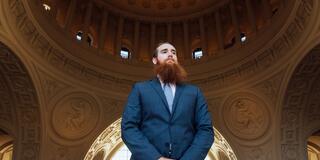The Tough Keep Going

Working for 17 years as a firefighter while also serving as a lieutenant in the U.S. Navy Reserve might be enough public service for some people. Not for Aaron Brennan.
As Brennan looked ahead to life after firefighting, he realized holding public office could be his next form of service.
Last year, as Brennan started thinking about a run for office, he applied to USF’s new Master of Arts in Public Leadership (MAPL) program, from which he graduated this year. Before graduating, he had launched his campaign for a seat on the San Diego City Council.
A Deep Dive
Designed for veterans and military families but open to anyone who’s interested in public service, the MAPL program gives students a deep dive into public office. Coursework — a blend of online learning plus five in-person weekend seminars in San Francisco and in Washington, D.C. — includes campaign strategy, fundraising, advocacy work, and polling research.
Class discussion is often tailored to those who have served, including how to communicate the value and relevance of military service to a population increasingly unfamiliar with the military.
“There are a ton of recently returned veterans who are looking to continue serving their country somehow. We’re trying to say, ‘Here are some of the ways you can do that,’” said Seth Lynn, administrative director of MAPL and founder of Veterans Campaign, a nonprofit organization that has trained veteran leaders on both sides of the political aisle. MAPL is a partnership between Veterans Campaign and USF.
Lynn, a major in the Marine Corps Reserve, said there’s a lot of overlap between military service and Jesuit values.
“Anybody who joins the military in this generation has this sense of taking care of your community, taking care of those who need help. With this MAPL program, we’re saying there’s a group of people out there who are potential outstanding leaders.”
In July, Craig Newmark, the founder of Craigslist, gave USF $1 million to support the MAPL program. “I think as a country, the least we owe to veterans is benefits including medical coverage and education,” said Newmark.
Only USF
MAPL, which is nonpartisan, is unique among programs focused on veterans, Lynn said. Some nonprofits provide an overview of running for office, and some political action committees help prepare veterans for the campaign trail.
But few, if any, other universities offer programs where veterans can learn all the skills they’ll need to run for elected office.
USF’s program aligns with an uptick in recent years of more veterans willing to seek public office, Lynn said. Veterans of the Vietnam War era, by contrast, weren’t as interested in running for office, often returning home to a public that didn’t value their service.
Brennan, the firefighter and Navy Reservist who has been called to active duty several times since 9/11, last year decided the pieces had fallen into place for him to run for office. Just five months into the MAPL program, he filed to run for a city council seat in San Diego. The primary election is in March 2020; the top two candidates will then advance to the general election.
“It’s almost like I’d had a campaign consultant before I had a campaign consultant,” said Brennan. “All the people who taught my classes were experts in their fields. I’ll be in a situation on my actual campaign and I’ll realize it’s not the first time I’m hearing something. I already have knowledge of what I should talk about and what my concerns should be.”
Beyond Elected Office
Not all MAPL students will run for public office, Lynn said. Some may lead political campaigns, run nonprofit organizations, or do political consulting or advocacy work.
Take George Chewning MAPL ’19. He served five years in the U.S. Army and is now a program manager at Facebook. While he says he can envision running for public office at some point, he joined the MAPL program to gain a solid grounding in politics and to open doors to other avenues of service.
Already, he’s putting his skills to use as a member of the City of San Francisco’s Veterans Affairs Commission. Appointed last February before he even finished the MAPL program, Chewning makes recommendations to the city board of supervisors and mayor on any issues concerning veterans. The position certainly touches on politics, he said, though it’s not an elected office.
“With this program, you don’t have to have a campaign in mind or know exactly what your next step is going to be in order to be successful,” said Chewning. “The skills and experiences you gain through the program can be applied in many ways beyond political campaigns.”


